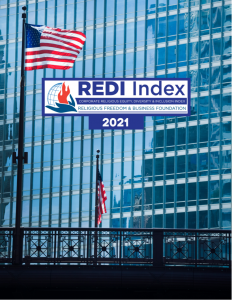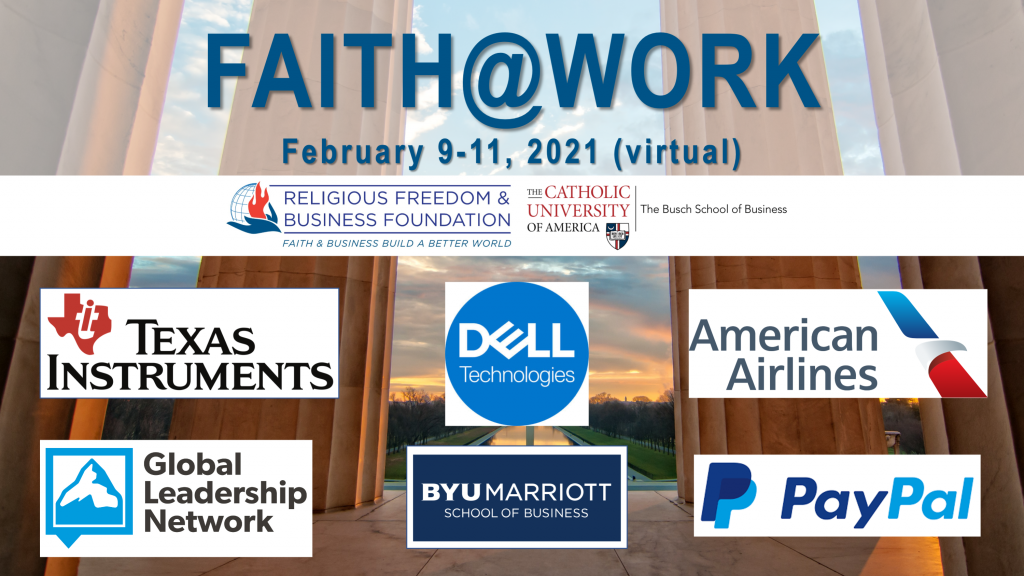by Kent Johnson, J.D., Senior Corporate Advisor, Religious Freedom & Business Foundation
Part of the blog series, Authenticity & Connection
Today, business leaders are directing programmers and technologists to construct Artificial Intelligence systems that have global ethical impact. “AI” is enabling enormous medical, economic and social advances – and also enabling some alarming incivility and intolerance. Its impact on society is huge and expanding rapidly. Problem is: AI lacks the capacity for moral or spiritual discernment. We need perspectives of faith and belief in the rooms where AI decisions are being made.
Like all transformative technologies, AI capabilities that were originally intended for good can be diverted to serve destructive purposes. Computer algorithms that were designed to relentlessly improve efficiency and short-term profitability, if not informed also by ethical considerations, lead to moral, ecological and social disaster. Some AI has been designed to steer popular search engines so that sensational and divisive content is amplified, in order to increase “hits” and advertising revenue at the expense of civility. AI is increasingly being leveraged to “automatically” monitor, target, investigate, censor and even punish people who make presumably undesirable statements, including expressions deemed by those in power to be “hate speech” or “fake news.” In some countries, government officials use AI to monitor and control publicly accessible discourse by broad categories of people whom they presume to be “suspect,” without any avenue for appeal. AI has been commandeered to enable hacking and theft, to perpetrate fraud and enable hate crimes. The threat to freedom and civility is real.
In an effort to advance thinking worldwide on how to navigate the emerging world of AI, the Religious Freedom and Business Foundation enlisted several highly qualified experts on the topic of AI and Faith to speak at its second Faith@Work ERG Conference in February, 2021. At the end of this article there’s a link where you can learn more about the specific topics covered, and RFBF videos of these eminent speakers.
Our purpose in this conference (and this blog) is not to advocate any particular faith’s perspectives on the ethical ramifications of AI, but rather to draw attention to the work that’s already underway to connect faith to work in this crucial arena, and to encourage leaders throughout commerce to purposefully and systematically seek out and thoughtfully consider perspectives of religiously diverse people on the ethical implications of AI.
- – Rear Admiral Margaret Grün Kibben, Chaplain of the US House of Representatives and a founding member of the influential group AI and Faith.
- – Zahra Jamal, PhD, Associate Director of the Boniuk Institute at Rice University.
- – Michael Paulus, PhD, Director and Associate Professor of Information Studies at Seattle Pacific University.
- – Frank Torres, Director of Public Policy in Microsoft’s Office of Responsible AI.
- – David Brenner, Esq., Board Chair of the group AI and Faith, and contributor to a Statement of Principles on “How AI can listen to religion and get better.”
- – Cory Andrew Labrecque, PhD, Director of the Master of Arts in Bioethics Program at the Center for Ethics at the University of Laval, and also a founding director of AI and Faith.
- – Patricia Shaw, Esq., CEO and Founder of Beyond Reach Consulting Ltd, which supports organizations in the delivery of ‘ethics by design’ across the AI lifecycle.
- – Nicoleta Acatrinei, PhD, an economist and Project Manager at Princeton University’s Faith and Work Initiative and also a founding member of AI and Faith.
- – Paul Taylor, a founding member of AI and Faith and a teaching pastor and elder at Peninsula Bible Church in Palo Alto with a degree in industrial engineering from Stanford, who blogs on tech and theology.
- – Deborah Rundlett, DMin, founder of Poets & Prophets, a global community of change leaders.
- – Michael Quinn, PhD, Dean of the College of Science and Engineering at Seattle University, Director of Seattle University’s Initiative in Ethics and Transformative Technologies and author of the seminal book Ethics for the Information Age.
- – Yaqub Chaudhary, PhD, a former/recent Research Fellow in AI, Philosophy and Theology at Cambridge Muslim College who has researched AI, cognitive science and neuroscience in connection with Islamic conceptions.
We at RFBF hope these eminent speakers’ reflections will influence companies to think more deeply about the ramifications of their use of AI, and to purposefully and systematically enlist the perspectives of their religiously diverse workforces. We stand at a turning point for humanity. People’s faith and core beliefs carry much wisdom to help navigate the world of Artificial Intelligence. We should tap into that wisdom.


















